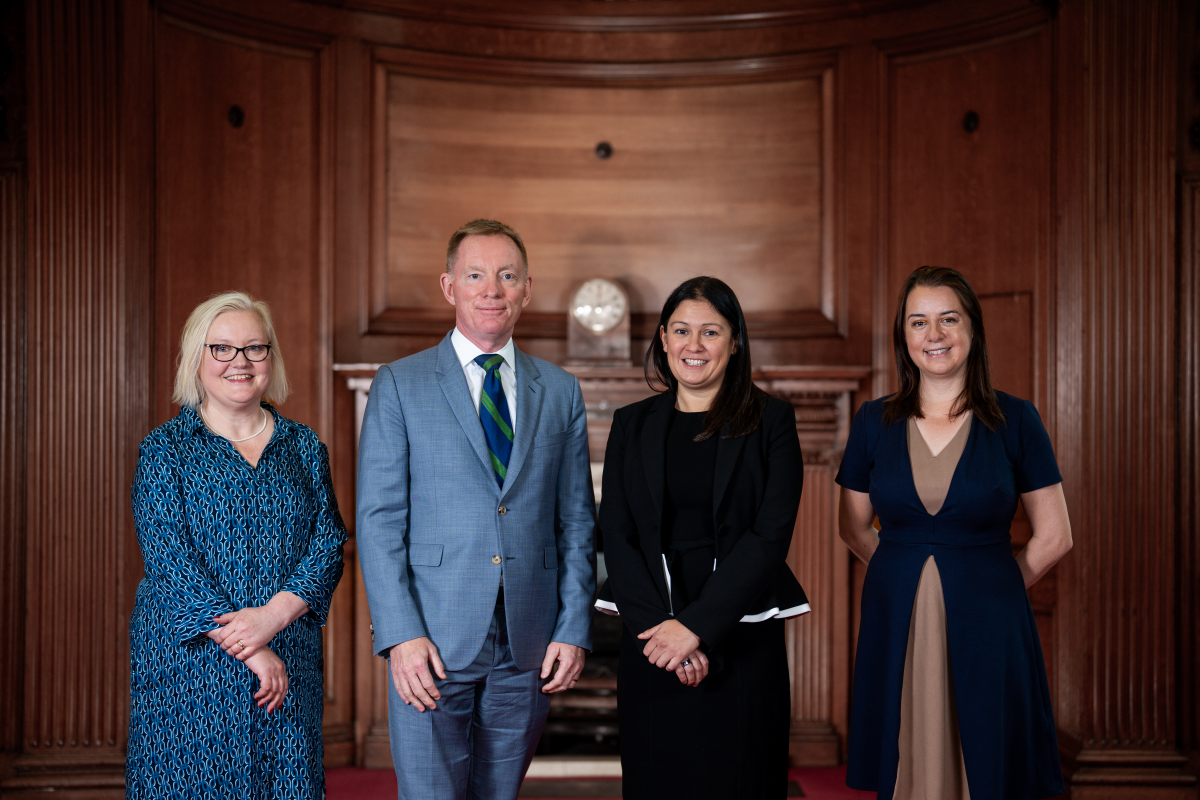
DCMS Ministerial team (l-r): Baroness Twycross, Chris Bryant MP, Lisa Nandy MP and Stephanie Peacock MP
Who’s who and who’s new in cultural policy making
With a change of government, new faces are taking charge of cultural policy in the UK. Here's Arts Professional's guide to the current movers and shakers in the Houses of Parliament and devolved Assemblies.
Following the general election and the subsequent change of leadership and shake up of ministries, Arts Professional has taken stock of who is now responsible for determining the future of the arts sector.
With arts and culture policymaking devolved to the national assemblies of Scotland, Wales and Northern Ireland, we've also included key figures across the nations, as well as shadow ministers and spokespersons.
Secretary of State for Digital, Culture, Media and Sport
Lisa Nandy has been appointed Secretary of State at the Department of Culture, Media and Sport (DCMS) with overall responsibility for strategy and policy. MP for Wigan since 2010, Nandy was Shadow Cabinet Minister for International Development before the election. She was handed the culture brief by Prime Minister Keir Starmer after former Shadow Culture Secretary Thangam Debbonaire failed to win a seat in parliament.
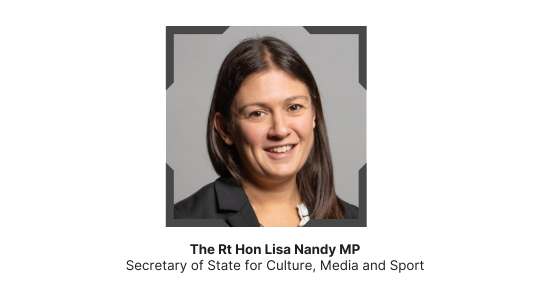
In her first interviews, Nandy has said the Labour government is committed to reviewing Arts Council England. She has also pledged to end “needless party politicisation” of public appointments made by DCMS to bodies such as Arts Council England, the BBC and the British Museum, and to appoint more leaders from outside London and the South East.
Parliamentary Under Secretaries of State at DCMS
Stephanie Peacock MP has been appointed Parliamentary Under-Secretary of State at DCMS and is the Minister for Sport, Media, Civil Society and Youth. A former teacher and political officer for the GMB trade union, she has been MP for Barnsley South since 2017, previously serving as opposition Whip, Shadow Minister for the Veterans' Office and Shadow Minister for Fisheries, Water and Flooding. Her new remit includes Ceremonials.
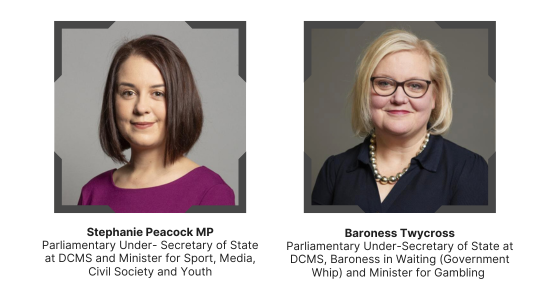
Joining Peacock from the House of Lords is Fiona Twycross, Baroness Twycross – appointed Parliamentary Under-Secretary of State at DCMS and Minister for Gambling. Nominated to the Lords in 2022, Twycross was a member of the London Assembly from 2012-2020 and is the Mayor of London's Deputy Mayor for Fire and Resilience.
Minister for Creative Industries, Arts and Tourism
Sir Chris Bryant, MP for Rhondda and Ogmore, has has a dual ministerial role as Minister of State for Creative Industries, Arts and Tourism in DCMS and Minister of State for Data Protection and Telecoms in the Department of Science, Innnovation and Technology. His responsibilities include Data Protection and Telecoms.
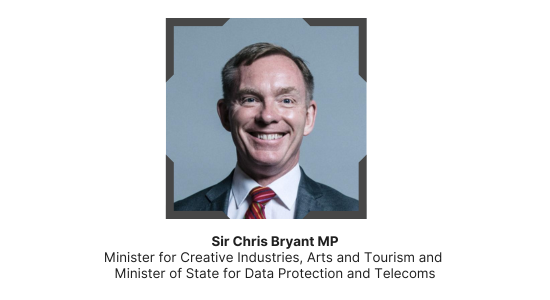
For DCMS, Bryant’s brief covers arts and libraries, creative industries, museums and cultural property, cultural diplomacy and soft power, tourism and heritage. Previously he served as Shadow Minister for Creative Industries and Digital, representing Labour at several creative hustings, in which he promised his party would review “the whole package” of arts funding and was critical of the lack of access to arts education in schools.
He was shadow Minister for the Arts from December 2014 to September 2015 under former Labour leader Jeremy Corbyn and was appointed Shadow Leader of the House of Commons in 2015, resigning after the Brexit vote. Under Gordon Brown, Bryant held roles as Deputy Leader of the House of Commons, Parliamentary Under-Secretary of State for Foreign Affairs and Minister for Europe.
Education and local government
With Keir Starmer pledging to reverse the decline in arts education during a Labour Creatives conference earlier this year, the Department of Education looks set to play an increasingly important role in the cultural life of the country.
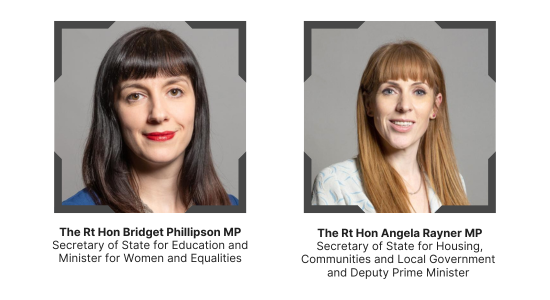
Bridget Phillipson is the newly-appointed Secretary of State for Education. An MP for Houghton and Sunderland South since May 2010, she launched an independent review of the schools curriculum in England as part of government efforts to ensure arts and creativity have a place in children's education. Following the review, all state schools will be required by law to teach the national curriculum up to age 16, including academies that currently don't have to follow it.
Deputy Leader of the Labour Party, Angela Raynor, is the new Secretary of State for Housing, Communities and Local Government. Her first act was to drop the department's levelling-up moniker added by the Conservatives and revert to the former name.
In recent years, the department's most significant impact on the arts and culture sector came via the £4.8bn Levelling-Up Fund of 2020. The fund ranked all local authorities into three tiers by need and designated an estimated £1.1bn to cultural projects.
Any schemes Raynor has for cultural funding have yet to be revealed, but Keir Starmer has indicated he plans to devolve decisions on culture to local authorities and Labour’s election manifesto pledged to “give councils multi-year funding settlements and end wasteful competitive bidding”.
Devolved Assemblies
Policy and legislation relating to arts and culture are devolved to the National Assemblies of Scotland, Wales and Northern Ireland. This includes issues related to tourism, sport and heritage, but media-related policy typically remains under the scrutiny of Westminster.
These are the key players in the devolved parliaments and assemblies.
In Scotland, the Cabinet Secretary for Culture is Scottish National Party MSP for Edinburgh Central Angus Roberston. He was appointed to the cabinet in May 2021 and reappointed in March 2023. He is also Cabinet Secretary for the Constitution, External Affairs and Culture and previously served as a Westminster MP for Moray from 2001 to 2017.
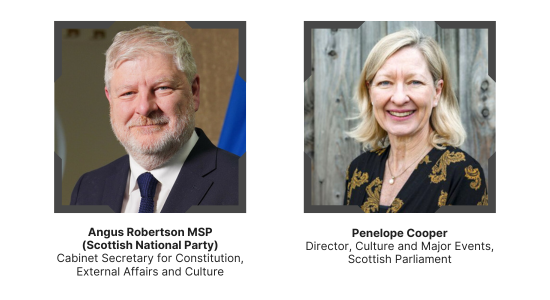
The Scottish Minister for Culture, Europe and International Development's supporting junior ministerial role was abolished in May 2024 so now, Robertson is aided by Penelope Cooper, Director of Culture and Major Events.
Following the restoration of the Northern Ireland Assembly in February this year, Democratic Unionist MLA for East Antrim, Gordon Lyons was appointed the new Minister for the Department for Communities with a wide remit covering culture, sports, leisure and historic and cultural affairs alongside housing, social security and welfare, and employment services.
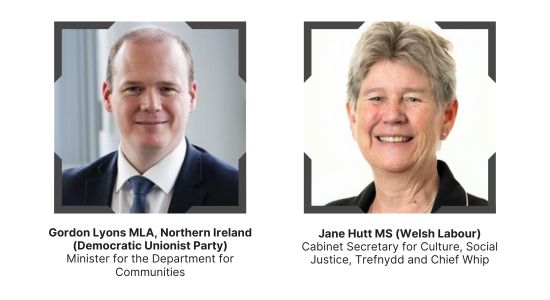
In Wales, the Cabinet Secretary for Culture and Social Justice is Labour Party MS for the Vale of Glamorgan Jane Hutt. She was appointed in July after Lesley Griffiths, who had only been in the role for four months, resigned in protest over former First Minister Vaughan Gething's leadership. Hutt's responsibilities include culture and the arts, broadcasting and media policy alongside sport, equality and welfare.
Shadow Department for Culture, Media and Sport
The Conservative party has named shadow ministers for DCMS, with Julia Lopez as Shadow Secretary of State. MP for Hornchurch & Upminster since June 2017, Lopez previously served as Minister of State for Media, Data and Digital Infrastructure from 2021-2022 under Boris Johnson, resigning over his handling of allegations of misconduct against Chris Pincher. She was reappointed by both Liz Truss and Rishi Sunak.
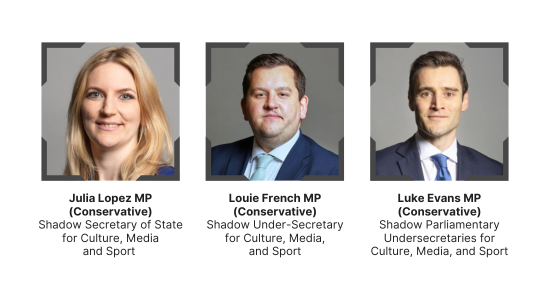
Louie French and Luke Evans become Shadow Parliamentary Under-Secretaries for Culture, Media and Sport. French, MP for Old Bexley and Sidcup since 2021, was previously a local councillor and a research analyst for a financial planning firm. Opposition Whip Evans was a GP from 2013 until he was elected MP for Hinckley and Bosworth in 2019.
Liberal Democrat Party spokesperson for culture
The Liberal Democrat Spokesperson for Culture, Media and Sport remains Baroness Bonham-Carter, who has held the role since 2015. Before becoming a peer, she worked in TV at BBC and Channel 4 and currently sits on the Lord Speaker's Advisory Panel on Works of Art.
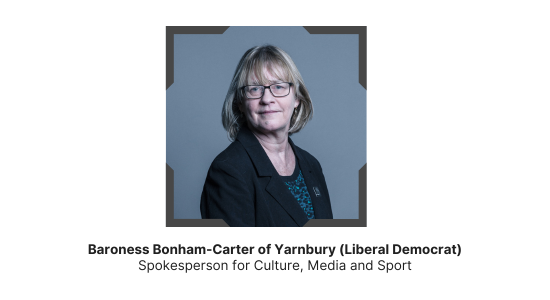
Commons Select Committee and APPGs
The main scrutiny of cultural policy takes place in the Commons Select Committee for DCMS. Following the general election, the new members of the committee have yet to be announced.
All-Party Parliamentary Groups (APPGs) bring together MPs and peers from across the political spectrum to work on topics of mutual interest, raise awareness of relevant issues and make recommendations to the government.
In the arts sector, they are focused on communicating the value of the creative industries and the importance of sustaining a vibrant cultural ecology across the four nations of the UK. Membership of these APPGs has also yet to be announced.
Join the Discussion
You must be logged in to post a comment.